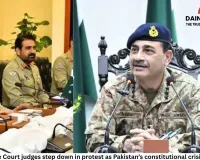Pakistan Condemns Rajnath Singh’s Sindh Remark as ‘Provocative’
Digital Desk

Pakistan on Sunday sharply criticised Indian Defence Minister Rajnath Singh’s recent comments suggesting that Sindh could “return to India,” describing the statement as provocative and a violation of international norms. The response came hours after Singh, speaking at a Sindhi community event in Delhi, said that although Sindh is not part of India today, cultural ties remain strong and “borders can change at any time.”
In a strongly worded statement, Pakistan’s Foreign Office said the remarks undermine established international boundaries and could aggravate tensions between two nuclear-armed neighbours. Islamabad called on Indian leaders to avoid rhetoric that threatens regional stability, adding that such statements contradict the principles of international law.
Pakistan also used the opportunity to reiterate its position on Jammu and Kashmir, asserting that the issue must be resolved in line with UN resolutions and the wishes of the Kashmiri people. It further urged India to “ensure the safety and rights of minorities,” a comment New Delhi is expected to dismiss as interference in internal affairs.
While Islamabad condemned Singh’s comments, Sindhi separatist leader Shafi Burfatchief of the banned Jeay Sindh Muttahida Mahaz (JSMM) welcomed them. Calling Singh’s remarks “historic and inspiring,” Burfat said they strengthen the aspirations of Sindhis seeking independence from Pakistan. He accused Islamabad of suppressing Sindhi identity, restricting political participation, and exploiting the province’s natural resources.
Sindh, now a key province of Pakistan, was part of the Bombay Presidency until 1936. Its separation was backed by both Hindu and Muslim leaders who argued that the region’s interests were overshadowed by dominant Gujarati and Marathi influences. Sindh’s political landscape later became central to the Pakistan movement, with the Sindh Assembly becoming the first provincial body to endorse the creation of Pakistan in 1942.
The escalating exchange comes at a time of already fraught ties between India and Pakistan, with no high-level dialogue held in years. Analysts warn that inflammatory statements on either side risk further hardening diplomatic positions and reducing prospects for meaningful engagement.







.jpg)



